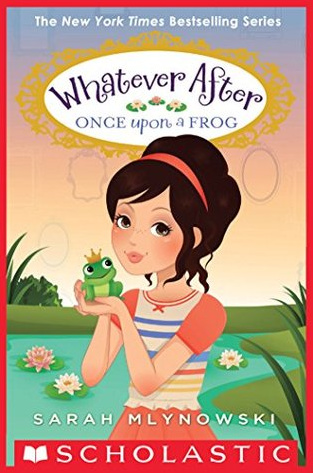

“Jonah has that strange look on his face. He must have another of Maryrose’s memories. Probably that she once sang a lullaby on a windy day. OR SOMETHING ELSE TOTALLY USELESS. “Is it about canoeing?” I ask, trying to be positive. He scratches his head. “It is! Maryrose was good at canoeing!” Oh! Yay! “Did she ever stop a boat?” “Yes!” he exclaims. Great! “How?” I ask. “With paddles!” he says. Argh. “Thanks for nothing, Maryrose’s memories!” I yell. “We have to stop this canoe!”
― Sarah Mlynowski, quote from Once Upon a Frog
“Do you know I ate frog legs once?” Jonah asks. Uh-oh. “You what?” screams a horrified Frederic. “It’s true!” Jonah says, clearly not catching the stop talking look I’m shooting him. “We went to a French restaurant for our dad’s birthday and he ordered an appetizer of frog legs. Remember, Abby? We tried them! Both of us did!” “It was before I knew you,” I tell Frederic apologetically. “They tasted like chicken!” Jonah exclaims. He’s right. They did taste like chicken. “I think I’m going to throw up,” Frederic moans.”
― Sarah Mlynowski, quote from Once Upon a Frog
“Well, there are other versions of the story,” I say, thinking out loud. “Besides the throwing and the kissing.” “Like what?” Frederic asks. I bite my lip. This is going to be worse than the frog-legs conversation. “Well, there’s the one where the princess chops off the frog’s head, and then he turns into a prince,” I say all in a rush. Frederic’s eyes almost pop out of his head. “I do not wish to try that one.”
― Sarah Mlynowski, quote from Once Upon a Frog
“We find our way to the marble kitchen, open the fancy silver fridge, and serve ourselves a heaping plate of coleslaw and chicken fingers. “Mmm,” I say. Prince makes sloppy eating sounds. “Delicious,” says Jonah. He smiles at Frederic. “Tastes just like frog legs.” I laugh so hard I snort coleslaw out of my nose.”
― Sarah Mlynowski, quote from Once Upon a Frog
“I’m still irritated at the end of the day when my brother, Jonah, and I are standing outside school, waiting for our dad to pick us up. It doesn’t help when Brandon says, “Bye, Crabby Abby,” as he strolls past me. He walks home from school by himself. Either his parents trust him to make his way home alone or they think he’s awful, too, and are hoping he gets kidnapped.”
― Sarah Mlynowski, quote from Once Upon a Frog

“Everyone is faking it, all of them pretending to be something they’re not. The whole world is built on lies and deceit.”
― Shari Lapena, quote from The Couple Next Door
“Thus the man who is responsive to artistic stimuli reacts to the reality of dreams as does the philosopher to the reality of existence; he observes closely, and he enjoys his observation: for it is out of these images that he interprets life, out of these processes that he trains himself for life.”
― Friedrich Nietzsche, quote from Twilight of the Idols/The Anti-Christ
“The world was made for the dead. Think of all the dead there are...There's a million times more dead than living and the dead are dead a million times longer than the living are alive...”
― Flannery O'Connor, quote from The Violent Bear It Away
“She would defy laws and kings and Mages and demons and even the Church of Light to be with him. She would tear down the barriers that still lived in her mind, confront whatever darkness lurked behind them, and defeat the Mage who thought to claim her soul. That soul--and every part of her--belongs to Ranier vel'En Daris. There would never be happiness for her that did not include him.”
― C.L. Wilson, quote from Lady of Light and Shadows
“Hearts can never be stolen, Cy. They can only be given.” – Ren”
― Sherrilyn Kenyon, quote from Retribution
BookQuoters is a community of passionate readers who enjoy sharing the most meaningful, memorable and interesting quotes from great books. As the world communicates more and more via texts, memes and sound bytes, short but profound quotes from books have become more relevant and important. For some of us a quote becomes a mantra, a goal or a philosophy by which we live. For all of us, quotes are a great way to remember a book and to carry with us the author’s best ideas.
We thoughtfully gather quotes from our favorite books, both classic and current, and choose the ones that are most thought-provoking. Each quote represents a book that is interesting, well written and has potential to enhance the reader’s life. We also accept submissions from our visitors and will select the quotes we feel are most appealing to the BookQuoters community.
Founded in 2023, BookQuoters has quickly become a large and vibrant community of people who share an affinity for books. Books are seen by some as a throwback to a previous world; conversely, gleaning the main ideas of a book via a quote or a quick summary is typical of the Information Age but is a habit disdained by some diehard readers. We feel that we have the best of both worlds at BookQuoters; we read books cover-to-cover but offer you some of the highlights. We hope you’ll join us.